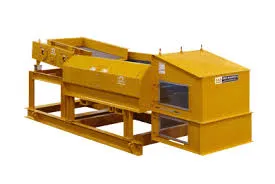

Lis . 21, 2024 00:03 Back to list
Industrial Scrap Metal Shredders Revolutionizing Recycling
In today's fast-paced industrial landscape, effective recycling of scrap metal has become increasingly important. Not only does it contribute to environmental sustainability, but it also represents a significant economic opportunity for businesses involved in metal recovery and recycling. One of the key pieces of equipment that has revolutionized the recycling process is the industrial scrap metal shredder. These machines play a crucial role in reducing the size of metal waste, making it easier and more efficient to process and recycle.
What is an Industrial Scrap Metal Shredder?
An industrial scrap metal shredder is a powerful machine designed to break down large pieces of metal into smaller, manageable sizes. This process is known as shredding and is essential for preparing metal for further processing and recycling. Metal shredders can handle a variety of materials, including ferrous and non-ferrous metals such as steel, aluminum, copper, and brass. The shredders utilize a series of rotating blades, which slice and chop the metal into smaller fragments, making it easier to transport and recycle.
The Importance of Shredding in Metal Recycling
Shredding is a critical step in the metal recycling process. It not only reduces the physical size of scrap metal but also increases its surface area, which enhances the efficiency of subsequent recycling processes. Smaller metal particles are easier to melt down, and the shredding process can effectively separate different types of metals. This separation is crucial as it allows for the recovery of pure metals, which can then be reused in manufacturing new products. Without shredding, recycling metal would be much more challenging, time-consuming, and less efficient.
Environmental Benefits
The use of industrial scrap metal shredders has significant environmental benefits. By promoting recycling and reusing metals, these machines help reduce the need for mining and extraction of new raw materials, which can be both environmentally damaging and resource-intensive. Furthermore, recycling metal consumes less energy compared to producing new metal from ore. According to studies, recycling aluminum saves up to 95% of the energy required to create new aluminum. Similarly, recycling steel can save about 60% of energy, leading to substantial reductions in greenhouse gas emissions.

Economic Advantages
From an economic perspective, metal shredders offer numerous benefits to businesses. The efficient processing of scrap metal allows companies to maximize their profits by turning waste into valuable resources. Shredding not only improves the quality of the recycled metal but also increases its market value. As industries worldwide increasingly commit to sustainable practices, the demand for recycled metals continues to rise, providing scrap metal processing businesses with lucrative opportunities.
Moreover, investing in modern scrap metal shredders can lead to lower operational costs. Advanced shredding technologies are designed for efficiency, requiring less energy while producing high-quality shredded metal. This efficiency translates into cost savings, enabling companies to offer competitive prices for their products.
The Future of Metal Shredding
As technology continues to evolve, the future of industrial scrap metal shredders looks promising. Innovations in shredding technology are expected to enhance efficiency and performance, allowing for even greater recovery rates of precious metals. Automation and digitalization trends are also making their way into the shredding industry, with smarter machines that can monitor performance in real-time and optimize operations.
Additionally, with the growing trend toward sustainability, government regulations are likely to become stricter, pushing industries to invest more in recycling technologies. This creates a favorable environment for the growth of the industrial scrap metal shredder market.
Conclusion
In conclusion, industrial scrap metal shredders are an essential component of the recycling industry. Their ability to efficiently process and reduce scrap metal not only benefits businesses by maximizing resource recovery but also contributes to environmental sustainability. As industries strive to become more eco-friendly, the role of shredders will become even more critical, ensuring that metal recycling remains a viable and economically advantageous option in a rapidly changing world. Investing in advanced shredding technologies could lead to significant economic and environmental gains for businesses and society alike, paving the way towards a more sustainable future.
Latest news
Troubleshooting Common Eddy Separator Problems
NewsJul.04,2025
The Role of Metal Recycling Plants in Circular Economy
NewsJul.04,2025
The Impact of Recycling Line Pickers on Waste Management Costs
NewsJul.04,2025
Safety Features Every Metal Shredder Should Have
NewsJul.04,2025
How Industrial Shredders Improve Waste Management Systems
NewsJul.04,2025
How Cable Granulators Contribute to Sustainable Recycling
NewsJul.04,2025